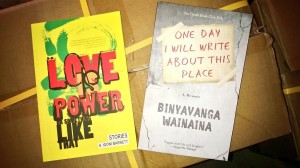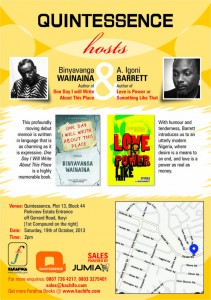PRESS RELEASE —
 Quintessence will, on Saturday the 19th of October, host the first readings of the Nigerian editions of critically acclaimed books by two authors.
Quintessence will, on Saturday the 19th of October, host the first readings of the Nigerian editions of critically acclaimed books by two authors.
 Igoni Barrett’s Love is Power, or Something Like That has been described as “Something alive, like that,” by none other than Nadine Gordimer. In this, his second collection of short stories, Igoni, with humour and tenderness, introduces us to an utterly modern Nigeria, where desire is a means to an end, and love is a power as real as money.
Igoni Barrett’s Love is Power, or Something Like That has been described as “Something alive, like that,” by none other than Nadine Gordimer. In this, his second collection of short stories, Igoni, with humour and tenderness, introduces us to an utterly modern Nigeria, where desire is a means to an end, and love is a power as real as money.
Binyavanga Wainaina, storyteller, essayist, and force of nature, won the Caine Prize in 2002 for his short story cum essay Discovering Home. This brilliant story has now been fleshed out into the incredible memoir of life lived, and home found, One Day I Will Write About This Place.
At 2 pm on Saturday 19 October 2013, Farafina presents the Nigerian editions of both books at the event of the year: Igoni and Binyavanga under one roof. We hope you can attend this double-billed reading, which will hold at Quintessence, Plot 13, Block 44 Parkview Estate Entrance, off Gerrard Road, Ikoyi. This links to the a blog post with further details of the event is here.